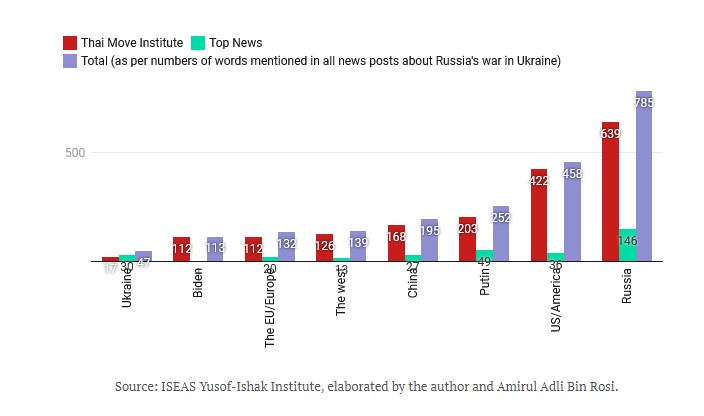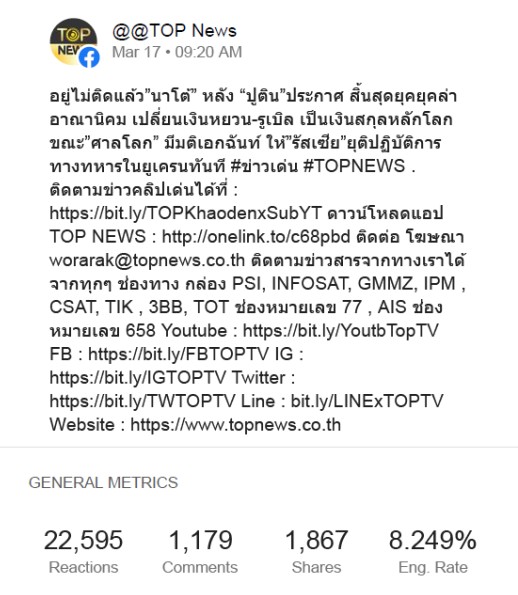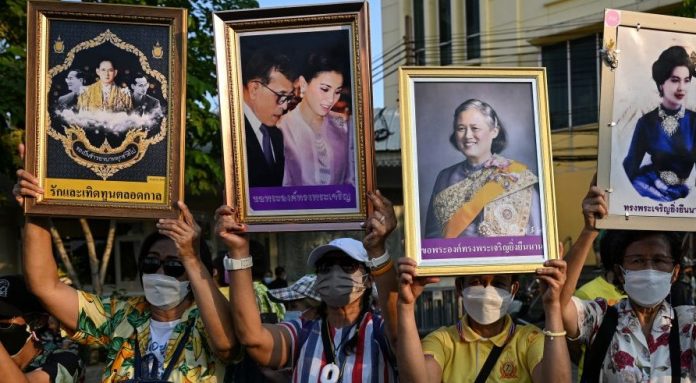Thai royalists’ online narratives echo the line that Russia’s war in Ukraine is succeeding. There are indications that this rhetoric is driven by anti-western anti-democratic sentiment, especially against the United States. The royalists are using the debate over the war as a proxy fight with opposition movements, whom they see as being supported by western pro-democracy forces.
More than two months into Russia’s war in Ukraine, various online royalist outlets in Thailand have continued to express their support for Russia’s actions. In contrast to their predecessors who had sided with the US against communism during the Cold War, contemporary Thai royalists espouse anti-Americanism. They equate the US’s global promotion of democracy and by extension domestic pro-democracy movements with a form of neo-imperialism. Accordingly, these royalists see Russia as standing up to the American ’empire’, bolstering former colonies in their fight against neo-colonialism.
Royalists in Thailand subscribe to royal nationalism that associates the Thai national identity with the supremacy of the monarchy. They are extremely proud of the history of Thai modern state-building during which past kings succeeded in safeguarding Thai national sovereignty from western colonisers from the 19th to the early 20th centuries. Organised royalist groups emerged against the backdrop of Southeast Asia’s fight against communism, with the mandate to defend the political establishment embodied by the monarchy and the military. Royalists have retained this agenda, but now view pro-democracy movements and democracy as the key threats against the Thai crown. Since 2005, royalist groups have engaged in offline and online information manipulation campaigns against opposition movements. At least since the 2014 coup, royalist outlets have increasingly incorporated global politics into their news posts, mainly portraying the US’s democracy promotion efforts around the world as a veiled agenda to retain its global hegemony. This narrative ultimately links the US’s pro-democracy agenda with its alleged endorsement of the Thai opposition movements that royalists deem as serving the interests of foreign powers.
This royalist ideological paradigm provides a basis for our understanding of their discursive support of Russia’s war. Similar to other supporters of the war, many royalists do not appreciate Putin simply as a strongman. They consider Putin and Russia as antidotes to the US-led liberal order dominating global politics since the fall of the Berlin wall. It is this world order that the royalists blame for the rise of domestic anti-establishment forces.
Based on a content analysis of the Facebook pages of key online outlets believed to represent royalist attitudes, Top News and the Thai Move Institute, the terms ‘US’ (in Thai, saharat) and ‘America’ were mentioned 458 times in news reports and commentaries about the war in Ukraine posted between 25 February and 24 April 2022. This frequency was second only to mentions of Russia (785 times). Although Ukraine is the other main party in the war, it was mentioned only in passing (47 times), suggesting that royalists see Ukraine as a proxy issue in a larger US-Russia confrontation. The US is often cast negatively as the ‘evil empire’ vis-à-vis Russia.

Figure 1. Keywords most mentioned in news reports and commentaries regarding Russia’s war in Ukraine posted in Thai Move Institute and Top News Facebook pages.
Royalist narratives of the war
Royalist narratives focus on three themes. The first attributes the war to the US’s ‘imperialist backing’ of Ukraine at Russia’s expense, forcing the latter to defend its ‘sovereignty’. This logic may be difficult to digest, but in a nutshell, key royalist figures seem to assume that Ukraine is a part of Russian territory rather than a sovereign country. Thus, the royalists justify Russia’s invasion as the rightful and ‘courageous’ defence of national interest in the face of western ‘neo-colonialism’ manifest in America’s influence on NATO’s membership expansion. This narrative also commends Putin for ‘liberating’ former colonies from the yoke of western imperialism. By arguing that all 35 nation-states that abstained from the United Nations vote to adopt the resolution condemning Russia in March 2022 are victims of the US empire, Top News commentators consider the abstentions the struggle of the ‘underdogs’ against colonialism. Relatedly, Russia is portrayed as being empathetic toward these smaller states, including Thailand, perpetually oppressed by the west. A royalist outlet accordingly claims that by standing up to the west, ‘Putin has declared the end of colonialism’.

Figure 2. One of the most ‘liked’ news reports on Top News page praising Putin as the ‘decoloniser’.
Although Russian forces have encountered significant setbacks in their military campaign and the outcome remains to be seen, royalist outlets continue pushing the narrative that Russia will win the war.
In line with Russia’s ‘declared end of western colonialism’, the second theme concerns the royalists’ projection of the US’s defeat in the war due to its decline. Royalist outlets predict the failure of sanctions against Russia, the detrimental side-effects these measures will have on the US and European economies, causing popular grievances or even uprisings, Russia’s military and nuclear superiority against the west, and the US’s eventual abandonment of Ukraine. The royalist media outlets compare Ukraine’s current situation with Thailand’s Cold War, in which Thailand ‘used to side with the Americans’ but was left to ‘deal with the Communists alone’ after the US lost the Vietnam War.
The third theme contrasts western demise with the rise of non-western, autocratic powers like Russia and China. According to royalist mouthpieces, Russia remains powerful despite western sanctions because of its alliance with ‘good’ friends such as China and India. Even US partners like Saudi Arabia have increasingly rallied behind Putin or China. Autocratic decisiveness to strike his enemies, within and outside Russia, is seen as why Putin will thrive in this war. Although Russian forces have encountered significant setbacks in their military campaign and the outcome remains to be seen, royalist outlets continue pushing the narrative that Russia will win the war.
Thai royalist narratives about Russia’s war in Ukraine align with Thailand’s diplomatic approach, which pivoted to China and Russia after the 2014 coup. However, whether this shift will last largely depends on the staying power of the palace- and military-backed regime that domestic opposition movements increasingly challenge. Who controls the news, in real life and in the information war online, will control the battlefield. JANJIRA SOMBATPOONSIRI/ FULCRUM




